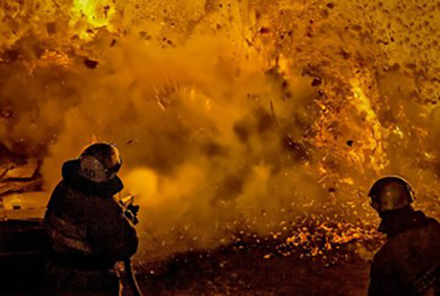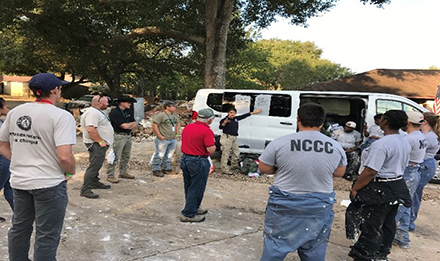By Stasia Widerynski

Research indicates climate change may uniquely affect workers. In response, the NIEHS Worker Training Program (WTP) hosted an annual virtual workshop for grantees and partners, May 18 - 19, 2022. The goal of the workshop was to highlight strategies for mitigating occupational hazards related to climate change and provide an opportunity for program staff, awardee organizations, and partners to engage in discussions and training sessions.
"Climate change is a critical challenge, and the worker training program has an important role to play to tackle the climate of crisis," said Sharon Beard, M.S., director of WTP.
Rising temperatures and shifting weather patterns can influence a wide range of occupational exposures, such as heat, ozone, polycyclic aromatic hydrocarbons and other chemicals, harmful microorganisms, certain diseases, violence, and wildfires.
"The worker training program has trained workers that have been called into response into many of the worst disasters in the U.S., but a lot of them have little background in climate change," continued Beard. "WTP is working to save lives and prevent injury every day, with the new need to address impacts of climate change for workers."
The Importance of Community Engagement

The workshop keynote address featured John Balbus, M.D., interim director of the Office of Climate Change and Health Equity at the U.S. Department of Health and Human Services. Balbus described the inextricable ties between climate change and social determinants of health and the significance of engaging communities in working toward solutions.
"Addressing fundamental health disparities is really an essential part of addressing climate change," he said. "The most important thing is community development and engagement."
A key message was training must be a collaborative, two-way exchange and relevant to the lives of workers. Trainers should conduct targeted outreach to the community as they develop the tools appropriate for a proper response, taking into account language requirements and cultural context. Content that builds on workers' existing knowledge and experience offers opportunities to engage in a meaningful and participatory manner.
One of the workshop panels focused on specific approaches to address climate change impacts on workers. Participants discussed how to empower workers and communities to engage with worker training programs. Panelists included:
- Donele Wilkins of the Midwest Consortium for Hazardous Waste Workers Training and president and CEO of the Green Door Initiative.
- Julie Thorstenson, Ph.D., executive director of the Native American Fish and Wildlife Society.
- Nancy Zuniga, M.P.H., program manager at the Institute of Popular Education of Southern California.
The panelists described their communities and the strategies that have helped them sustain key relationships through the trials of the COVID-19 pandemic, flooding, wildfires, and other disasters.
Additional WTP Resources
Established in 1986 under the Superfund Amendments and Reauthorization Act, WTP has supported numerous nonprofit organizations and provided training for environmental cleanup workers, first responders, health care employees, industrial and construction workers, law enforcement officers, transportation workers, and others who face occupational hazards.
WTP offers an extensive collection of training tools and educational materials as part of the National Clearinghouse for Worker Safety and Health Training .
Several resources are available for workers and climate change and disaster preparedness and response , which covers topics such as hurricanes and floods and wildfires .
Thorstenson, who is also a member of the Lakota Tribe, described effective relationship building. She encouraged staff to be respectful of the culture they are trying to engage with and make key efforts to safeguard environment, tribal, and cultural values.
Training Sessions and Climate Vulnerability Assessment Report
Participants joined mini-training sessions on a variety of environmental hazards, including wildfire, heat, and flooding. Experts in the field shared strategies and lessons learned in preparing for extreme weather events and provided tools and resources for protecting workers before, during, and after the event. These sessions provided an opportunity for attendees to ask questions and learn strategies for safeguarding their employees and providing effective training.
Attendees also provided feedback on the NIEHS WTP Climate Vulnerability Assessment Report (4MB) for updating the report and best ways to utilize it in the field. The report describes strategies to assess climate change vulnerabilities that may affect the Worker Training Program and worker populations and provides a checklist of important considerations when planning for a climate change-related event. The goal is to empower the grantee community to better plan for the health impacts and programmatic changes due to global climate change.


